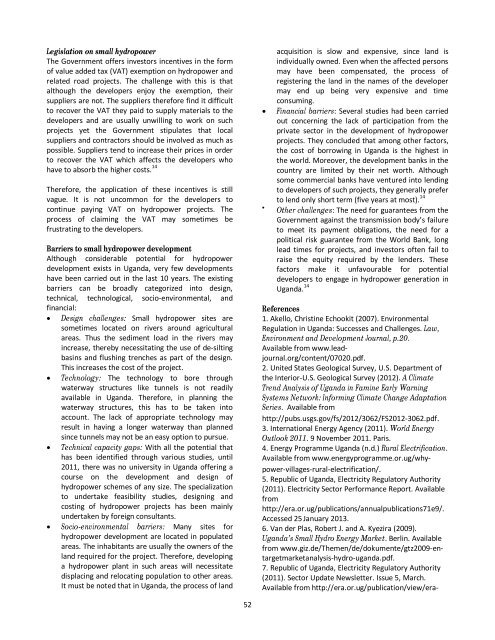WSHPDR_2013_Final_Report-updated_version
WSHPDR_2013_Final_Report-updated_version
WSHPDR_2013_Final_Report-updated_version
You also want an ePaper? Increase the reach of your titles
YUMPU automatically turns print PDFs into web optimized ePapers that Google loves.
Legislation on small hydropower<br />
The Government offers investors incentives in the form<br />
of value added tax (VAT) exemption on hydropower and<br />
related road projects. The challenge with this is that<br />
although the developers enjoy the exemption, their<br />
suppliers are not. The suppliers therefore find it difficult<br />
to recover the VAT they paid to supply materials to the<br />
developers and are usually unwilling to work on such<br />
projects yet the Government stipulates that local<br />
suppliers and contractors should be involved as much as<br />
possible. Suppliers tend to increase their prices in order<br />
to recover the VAT which affects the developers who<br />
have to absorb the higher costs. 14<br />
Therefore, the application of these incentives is still<br />
vague. It is not uncommon for the developers to<br />
continue paying VAT on hydropower projects. The<br />
process of claiming the VAT may sometimes be<br />
frustrating to the developers.<br />
Barriers to small hydropower development<br />
Although considerable potential for hydropower<br />
development exists in Uganda, very few developments<br />
have been carried out in the last 10 years. The existing<br />
barriers can be broadly categorized into design,<br />
technical, technological, socio-environmental, and<br />
financial:<br />
Design challenges: Small hydropower sites are<br />
sometimes located on rivers around agricultural<br />
areas. Thus the sediment load in the rivers may<br />
increase, thereby necessitating the use of de-silting<br />
basins and flushing trenches as part of the design.<br />
This increases the cost of the project.<br />
Technology: The technology to bore through<br />
waterway structures like tunnels is not readily<br />
available in Uganda. Therefore, in planning the<br />
waterway structures, this has to be taken into<br />
account. The lack of appropriate technology may<br />
result in having a longer waterway than planned<br />
since tunnels may not be an easy option to pursue.<br />
Technical capacity gaps: With all the potential that<br />
has been identified through various studies, until<br />
2011, there was no university in Uganda offering a<br />
course on the development and design of<br />
hydropower schemes of any size. The specialization<br />
to undertake feasibility studies, designing and<br />
costing of hydropower projects has been mainly<br />
undertaken by foreign consultants.<br />
Socio-environmental barriers: Many sites for<br />
hydropower development are located in populated<br />
areas. The inhabitants are usually the owners of the<br />
land required for the project. Therefore, developing<br />
a hydropower plant in such areas will necessitate<br />
displacing and relocating population to other areas.<br />
It must be noted that in Uganda, the process of land<br />
<br />
<br />
acquisition is slow and expensive, since land is<br />
individually owned. Even when the affected persons<br />
may have been compensated, the process of<br />
registering the land in the names of the developer<br />
may end up being very expensive and time<br />
consuming.<br />
Financial barriers: Several studies had been carried<br />
out concerning the lack of participation from the<br />
private sector in the development of hydropower<br />
projects. They concluded that among other factors,<br />
the cost of borrowing in Uganda is the highest in<br />
the world. Moreover, the development banks in the<br />
country are limited by their net worth. Although<br />
some commercial banks have ventured into lending<br />
to developers of such projects, they generally prefer<br />
to lend only short term (five years at most). 14<br />
Other challenges: The need for guarantees from the<br />
Government against the transmission body’s failure<br />
to meet its payment obligations, the need for a<br />
political risk guarantee from the World Bank, long<br />
lead times for projects, and investors often fail to<br />
raise the equity required by the lenders. These<br />
factors make it unfavourable for potential<br />
developers to engage in hydropower generation in<br />
Uganda. 14<br />
References<br />
1. Akello, Christine Echookit (2007). Environmental<br />
Regulation in Uganda: Successes and Challenges. Law,<br />
Environment and Development Journal, p.20.<br />
Available from www.leadjournal.org/content/07020.pdf.<br />
2. United States Geological Survey, U.S. Department of<br />
the Interior-U.S. Geological Survey (2012). A Climate<br />
Trend Analysis of Uganda in Famine Early Warning<br />
Systems Network: Informing Climate Change Adaptation<br />
Series. Available from<br />
http://pubs.usgs.gov/fs/2012/3062/FS2012-3062.pdf.<br />
3. International Energy Agency (2011). World Energy<br />
Outlook 2011. 9 November 2011. Paris.<br />
4. Energy Programme Uganda (n.d.) Rural Electrification.<br />
Available from www.energyprogramme.or.ug/whypower-villages-rural-electrification/.<br />
5. Republic of Uganda, Electricity Regulatory Authority<br />
(2011). Electricity Sector Performance <strong>Report</strong>. Available<br />
from<br />
http://era.or.ug/publications/annualpublications71e9/.<br />
Accessed 25 January <strong>2013</strong>.<br />
6. Van der Plas, Robert J. and A. Kyezira (2009).<br />
Uganda’s Small Hydro Energy Market. Berlin. Available<br />
from www.giz.de/Themen/de/dokumente/gtz2009-entargetmarketanalysis-hydro-uganda.pdf.<br />
7. Republic of Uganda, Electricity Regulatory Authority<br />
(2011). Sector Update Newsletter. Issue 5, March.<br />
Available from http://era.or.ug/publication/view/era-<br />
52


